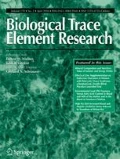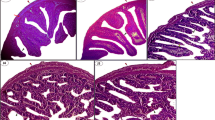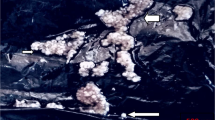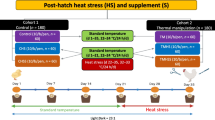Abstract
Arsenic is a trace element widely found in nature, and there are several forms of arsenic, including the most toxic form of trivalent arsenic. Arsenic trioxide (As2O3) is widespread in nature and tends to accumulate in animals and humans, thus causing great harm. Although the important role of heat shock proteins (HSPs) has been demonstrated in many types of mammals exposed to As2O3, the function of these proteins in poultry, especially in cocks, remains unclear. In this study, we used experimental animals (male chickens), which were fed a diet including 0, 7.5, 15, and 30 mg kg−1 As2O3, respectively, in the control, low, middle, and high groups. The livers were collected after the cocks were treated with arsenic for 30, 60, and 90 days. We detected HSP27, HSP60, HSP70, and HSP90 levels in the livers of the cocks by real-time PCR and HSP60 and HSP70 levels by Western blot. The results showed that the messenger RNA and protein expression of HSPs exposed to As2O3 had obviously increased. These results demonstrated that arsenic toxicity affected the expression of HSP levels in cock livers.


Similar content being viewed by others
References
Ahsan T, Zehra K, Munshi A, Ahsan S (2009) Chronic arsenic poisoning. J PAK MED ASSOC 59:105–107
Hall AH (2002) Chronic arsenic poisoning. Toxicol Lett 128:69–72
Kapaj S, Peterson H, Liber K, Bhattacharya P (2006) Human health effects from chronic arsenic poisoning—a review. J Environ Sci Health A Tox Hazard Subst Environ Eng 41:2399–2428
Supapong S, Phanthumchinda K, Srirattanaban J (2004) Nerve conduction studies in chronic arsenic poisoning patients. J Med Assoc Thail 87(Suppl 2):S207–S212
Xing MW, Zhao PP, Guo GY, Guo Y, Zhang KX, Tian L, He Y, Chai HL, Zhang W (2015) Inflammatory factor alterations in the gastrointestinal tract of cocks overexposed to arsenic trioxide. Biol Trace Elem Res 15:0305–0308
Guo Y, Zhao PP, Guo GY, Hu ZB, Tian L, Zhang KX, Zhang W, Xing MW (2015) The role of oxidative stress in gastrointestinal tract tissues induced by arsenic toxicity in cocks. Biol Trace Elem Res 15:0357–0359
Dick L, Parker LA, Mauro MA (1990) Chronic arsenic poisoning as a cause of increased hepatic density with CT. J Comput Assist Tomogr 14:828–829
Santra A, Maiti A, Das S, Lahiri S, Charkaborty SK, Mazumder DN (2000) Hepatic damage caused by chronic arsenic toxicity in experimental animals. J Toxicol Clin Toxicol 38:395–405
Lee H, Kang C, Yoo YS, Hah DY, Kim CH, Kim E, Kim JS (2013) Cytotoxicity and the induction of the stress protein Hsp 70 in Chang liver cells in response to zearalenone-induced oxidative stress. Environ Toxicol Pharmacol 36:732–740
Bernabo P, Rebecchi L, Jousson O, Martinez-Guitarte JL, Lencioni V (2011) Thermotolerance and hsp70 heat shock response in the cold-stenothermal chironomid Pseudodiamesa branickii (NE Italy). Cell Stress Chaperones 16:403–410
Figueiredo D, Gertler A, Cabello G, Decuypere E, Buyse J, Dridi S (2007) Leptin downregulates heat shock protein-70 (HSP-70) gene expression in chicken liver and hypothalamus. Cell Tissue Res 329:91–101
Del RL, Quintanilla-Vega B, Brambila-Colombres E, Calderon-Aranda ES, Manno M, Albores A (2001) Stress proteins induced by arsenic. Toxicol Appl Pharmacol 177:132–148
Luo S, Ahola V, Shu C, Xu C, Wang R (2015) Heat shock protein 70 gene family in the Glanville fritillary butterfly and their response to thermal stress. Gene 556:132–141
Chen X, Zhu YH, Cheng XY, Zhang ZW, Xu SW (2012) The protection of selenium against cadmium-induced cytotoxicity via the heat shock protein pathway in chicken splenic lymphocytes. Molecules 17:14565–14572
Flohe S, Dominguez FE, Ackermann M, Hirsch T, Borgermann J, Schade FU (1999) Endotoxin tolerance in rats: expression of TNF-alpha, IL-6, IL-10, VCAM-1 and HSP 70 in lung and liver during endotoxin shock. Cytokine 11:796–804
Schutte A, Topp SA, Knoefel WT, Brilloff S, Mueller L, Rogiers X, Gundlach M (2001) Influence of Ginkgo Biloba extract (EGB 761) on expression of EGR-1 mRNA and HSP-70 mRNA after warm ischemia in the rat liver. Transplant Proc 33:3724–3725
Sun BN, Xing MW (2015) Evaluated the twenty-six elements in the pectoral muscle of As-treated chicken by inductively coupled plasma mass spectrometry. Biol Trace Elem Res 015:0418–0
Yu J, Bao E, Yan J, Lei L (2008) Expression and localization of Hsps in the heart and blood vessel of heat-stressed broilers. Cell Stress Chaperones 13:327–335
Chen CJ (2014) Health hazards and mitigation of chronic poisoning from arsenic in drinking water: Taiwan experiences. Rev Environ Health 29:13–19
Tsuda T, Kume Y, Yamamoto M, Nagira T, Aoyama H (1987) A case of lung cancer associated with chronic arsenic poisoning caused by neighborhood exposure of As2O3 from Toroku mine. Sangyo Igaku 29:222–223
Vahter M (2008) Health effects of early life exposure to arsenic. Basic Clin Pharmacol Toxicol 102:204–211
Zhao FQ, Zhang ZW, Wang C, Zhang B, Yao HD, Li S, Xu SW (2013) The role of heat shock proteins in inflammatory injury induced by cold stress in chicken hearts. Cell Stress Chaperones 18:773–783
Pivovarova AV, Mikhailova VV, Chernik IS, Chebotareva NA, Levitsky DI, Gusev NB (2005) Effects of small heat shock proteins on the thermal denaturation and aggregation of F-actin. Biochem Biophys Res Commun 331:1548–1553
Yokota S, Minota S, Fujii N (2006) Anti-HSP auto-antibodies enhance HSP-induced pro-inflammatory cytokine production in human monocytic cells via Toll-like receptors. Int Immunol 18:573–580
Zheng Z, Park SY, Lee M, Phark S, Won NH, Kang HS, Sul D (2011) Effects of benzo(a)pyrene on the expression of heat shock proteins, pro-inflammatory cytokines and antioxidant enzymes in hepatic tumors induced by rat hepatoma N1-S1 cells. J Korean Med Sci 26:222–230
Banerjee S, Mitra T, Purohit GK, Mohanty S, Mohanty BP (2015) Immunomodulatory effect of arsenic on cytokine and HSP gene expression in Labeo rohita fingerlings. Fish Shellfish Immunol 44:43–49
Guo Y, Ziesch A, Hocke S, Kampmann E, Ochs S, De Toni EN, Goke B, Gallmeier E (2015) Overexpression of heat shock protein 27 (HSP27) increases gemcitabine sensitivity in pancreatic cancer cells through S-phase arrest and apoptosis. J Cell Mol Med 19:340–350
Moghimian M, Faghihi M, Karimian SM, Imani A, Mobasheri MB (2014) Upregulated hsp27 expression in the cardioprotection induced by acute stress and oxytocin in ischemic reperfused hearts of the rat. Chin J Physiol 57:329–334
Wu YL, Pan X, Mudumana SP, Wang H, Kee PW, Gong Z (2008) Development of a heat shock inducible gfp transgenic zebrafish line by using the zebrafish hsp27 promoter. Gene 408:85–94
Guay J, Lambert H, Gingras-Breton G, Lavoie JN, Huot J, Landry J (1997) Regulation of actin filament dynamics by p38 map kinase-mediated phosphorylation of heat shock protein 27. J Cell Sci 110(Pt 3):357–368
Flohe S, Speidel N, Flach R, Lange R, Erhard J, Schade FU (1998) Expression of HSP 70 as a potential prognostic marker for acute rejection in human liver transplantation. Transpl Int 11:89–94
Zhu Y, Lu X, Wu D, Cai S, Li S, Teng X (2013) The effect of manganese-induced cytotoxicity on mRNA expressions of HSP27, HSP40, HSP60, HSP70 and HSP90 in chicken spleen lymphocytes in vitro. Biol Trace Elem Res 156:144–152
Guo Y, Zhao PP, Guo GY, Hu ZB, Tian L, Zhang KX, Sun Y, Zhang XG, Zhang W, Xing MW (2015) Effects of arsenic trioxide exposure on heat shock protein response in the immune organs of chickens. Biol Trace Elem Res 015:0389–0381
Cheng YF, Sun JR, Chen HB, Abdelnasir A, Tang S, Kemper N, Hartung J, Bao ED (2014) Association of Hsp60 expression with damage to rat myocardial cells exposed to heat stress in vivo and in vitro. Genet Mol Res 13:9371–9381
Tacchini L, Schiaffonati L, Pappalardo C, Gatti S, Bernelli-Zazzera A (1993) Expression of HSP 70, immediate-early response and heme oxygenase genes in ischemic-reperfused rat liver. Lab Investig 68:465–471
Zanin-Zhorov A, Bruck R, Tal G, Oren S, Aeed H, Hershkoviz R, Cohen IR, Lider O (2005) Heat shock protein 60 inhibits Th1-mediated hepatitis model via innate regulation of Th1/Th2 transcription factors and cytokines. J Immunol 174:3227–3236
Schett G, Xu Q, Amberger A, Van der Zee R, Recheis H, Willeit J, Wick G (1995) Autoantibodies against heat shock protein 60 mediate endothelial cytotoxicity. J Clin Invest 96:2569–2577
Martinez J, Perez-Serrano J, Bernadina WE, Rodriguez-Caabeiro F (2001) HSP60, HSP70 and HSP90 from Trichinella spiralis as targets of humoral immune response in rats. Parasitol Res 87:453–458
Dix DJ (1997) Hsp70 expression and function during gametogenesis. Cell Stress Chaperones 2:73–77
Gabriel JE, Da MA, Boleli IC, Macari M, Coutinho LL (2002) Effect of moderate and severe heat stress on avian embryonic hsp70 gene expression. Growth Dev Aging 66:27–33
Kukreja RC, Kontos MC, Loesser KE, Batra SK, Qian YZ, Gbur CJ, Naseem SA, Jesse RL, Hess ML (1994) Oxidant stress increases heat shock protein 70 mRNA in isolated perfused rat heart. Am J Physiol 267:H2213–H2219
Xing H, Li S, Wang X, Gao X, Xu S, Wang X (2013) Effects of atrazine and chlorpyrifos on the mRNA levels of HSP70 and HSC70 in the liver, brain, kidney and gill of common carp (Cyprinus carpio L.). Chemosphere 90:910–916
Novoselova EG, Glushkova OV, Cherenkov DA, Parfenyuk SB, Novoselova TV, Lunin SM, Khrenov MO, Guzhova IV, Margulis BA, Fesenko EE (2006) Production of heat shock proteins, cytokines, and nitric oxide in toxic stress. Biochemistry (Mosc) 71:376–383
Edwards DP, Estes PA, Fadok VA, Bona BJ, Onate S, Nordeen SK, Welch WJ (1992) Heat shock alters the composition of heteromeric steroid receptor complexes and enhances receptor activity in vivo. BIOCHEMISTRY-US 31:2482–2491
Bagchi M, Bagchi D, Adickes E, Stohs SJ (1995) Chronic effects of smokeless tobacco extract on rat liver histopathology and production of HSP-90. J Environ Pathol Toxicol Oncol 14:61–68
Schiaffonati L, Rappocciolo E, Tacchini L, Cairo G, Bernelli-Zazzera A (1990) Reprogramming of gene expression in postischemic rat liver: induction of proto-oncogenes and hsp 70 gene family. J Cell Physiol 143:79–87
Albores A, Koropatnick J, Cherian MG, Zelazowski AJ (1992) Arsenic induces and enhances rat hepatic metallothionein production in vivo. Chem Biol Interact 85:127–140
Maitani T, Saito N, Abe M, Uchiyama S, Saito Y (1987) Chemical form-dependent induction of hepatic zinc-thionein by arsenic administration and effect of co-administered selenium in mice. Toxicol Lett 39:63–70
Acknowledgments
This study was supported by the Heilongjiang Province Natural Science Foundation (Grant No. C2015061).
Conflicts of Interest
The authors declare that they have no competing interests.
Author information
Authors and Affiliations
Corresponding authors
Additional information
Kexin Zhang and Panpan Zhao contributed equally to this work.
Rights and permissions
About this article
Cite this article
Zhang, K., Zhao, P., Guo, G. et al. Arsenic Trioxide Exposure Induces Heat Shock Protein Responses in Cock Livers. Biol Trace Elem Res 170, 459–465 (2016). https://doi.org/10.1007/s12011-015-0487-0
Received:
Accepted:
Published:
Issue Date:
DOI: https://doi.org/10.1007/s12011-015-0487-0




